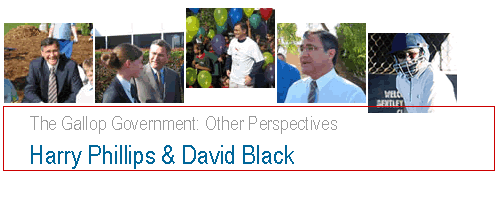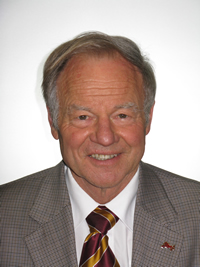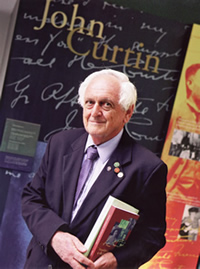
Dr Harry Phillips has been at the forefront of political and civic education in WA for four decades. As a political scientist he has been keenly interested, and published widely, about parliament, electoral law and elections, as well as sport. Particularly at election times he has fulfilled a media role as a political analyst. Currently Harry Phillips is a Parliamentary Fellow (Education), an Honorary Professor at Edith Cowan University, an Adjunct Professor at Curtin University of Technology and a Fellow of the Australian College of Educators.
Emeritus Professor David Black was born in WA and educated at Perth Modern School and the University of WA. After several years with the Western Australian Education Department he taught history and politics for more than thirty years at Curtin University of Technology (previously the Western Australian Institute of Technology). Over the years Professor Black has been a prominent television and radio commentator on electoral politics in WA and has authored numerous books and websites on WA political history and, in his capacity as Historical Consultant to the John Curtin Prime Ministerial Library, on the life and achievements of war time prime minister John Curtin.
In 2005 the University of New South Wales Press published 'Yes Premier: Labor's Leadership in Australia's States and Territories' edited by John Wanna and Paul Williams. The chapter on Geoff Gallop was written by Dr Harry Phillips and Professor David Black and given the title 'Geoff Gallop: A New Generation Man' but only dealt with the first four years of what proved to be a five year plus administration. In that context, and focussing on Gallop's first term in office, the authors highlighted the Premier's role respectively as an election campaigner, policy broker, decision-maker and crisis manager.
The 2001 election campaign was described from one interpretation as a 'stunning result' in terms of the large number of seats gained and the clear majority achieved in the Legislative Assembly. In addition, the election produced a working majority for the Government on issues with which it could secure support from the Greens, and this in a chamber where Labor had for more than a century been in a virtually permanent minority. Nevertheless, in the absence of an absolute constitutional majority in the Upper House, the extent of the victory was still not adequate in itself to ensure the passage of electoral reform legislation. Moreover, Labor's success had been much more significant in terms of seats than votes an outcome summed up by commentator Bruce Stone as a 'windfall' majority delivered by the poor performance of its principal opponent and the flow of preferences under the alternative vote electoral preferential system.
Phillips and Black describe Labor's policy mix under Gallop as 'carefully crafted' with perhaps the most telling promise of all Gallop's 'commitment to stop logging in old-growth forests'. At the same time the Gallop Government commenced its first term with a cautious approach to the state's finances and something like 40 reviews, encompassing nearly every portfolio, were commissioned in the first 100 days. From the outset the part played by Gallop himself became the centre-piece of the government with most of what the government did being in the name of the Premier. Major decisions during the government's first term were the changed route for the Mandurah-Perth Railway to follow a route down the centre of the Kwinana Freeway instead of the diversion to Kenwick; the blocking of development proposals for the Ningaloo Coast; and, on the other side of the ledger, the approval of the major Chevron-Texaco Gorgon gas project at Barrow Island.
 Dr Harry Phillips.
Dr Harry Phillips.
Photograph courtesy Dr Harry Phillips.
 Professor David Black.
Professor David Black.
Photograph courtesy Community Newspaper Group.
In dealing with political problems one important decision by the Premier in 2003 was to give the health portfolio to Attorney General Jim McGinty though generally speaking Gallop reshuffled the ministries rather than altering the personnel. In November 2001 he commissioned the Gordon Report in an attempt to deal with complaints of family violence and child abuse in Aboriginal communities; in June 2003 he personally imposed a youth curfew on the streets of Northbridge at night; and of particular long term importance, decided to 'revamp the Anti Crime Commission with a strengthened Corruption and Crime Commission'. Other major issues with which the government grappled centred on the attempted disaggregation of Western Power and the introduction of a Waterwise programme to deal with the declining water storage reserves.
In assessing Gallop's first term Phillips and Black refer to the Premier's long-standing admiration of Lord Forrest for the 'expansive view he had taken politics, including his creation of formidable infrastructure schemes and the role he believed that Western Australia could play in an Australian nation'. Issues awaiting further review include the nature and explanation for Gallop's success at the 2005 election; the achievement of electoral reform for the Legislative Assembly including its long term impact on the Legislative Council; and, in the aftermath of the Kimberley Canal proposal during the election campaign, the implementation of a water conservation plan commencing with the Cockburn Sound desalination plant.


